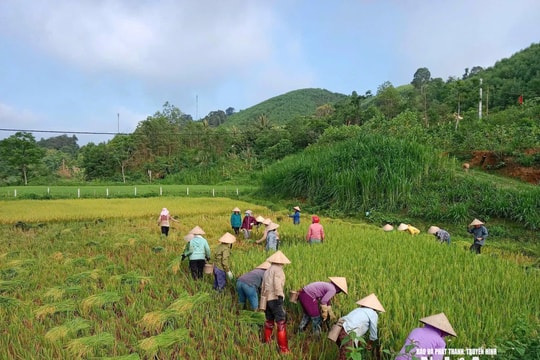The story of a female station chief struggling with healthcare in mountainous areas
(Baonghean.vn) - In the health sector of Quy Chau district, doctor Le Thi Quynh Giang, 41 years old, Head of Chau Thuan Commune Health Station, is mentioned as a shining example of the spirit of learning and striving; dedicated to work, to the village and to the patients.
Forever burning "fire" for the profession
Coming to Chau Thuan Commune Health Station, the first impression is that the facilities here are simple but very neat, green, clean and beautiful. The female station head - doctor Le Thi Quynh Giang herself has a very serious but caring and enthusiastic demeanor in examining, treating and consulting people about their health.
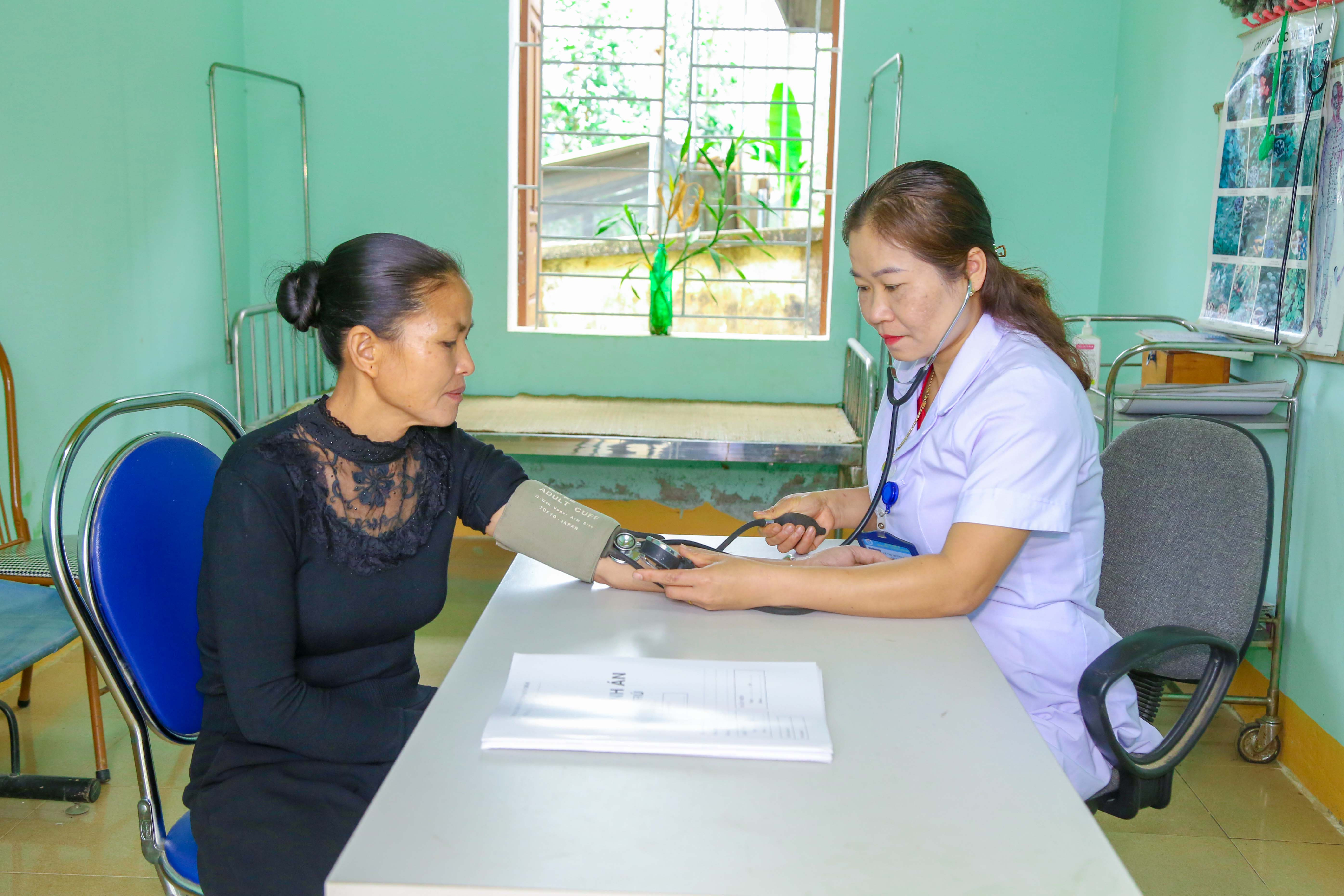 |
Doctor Le Thi Quynh Giang is always attentive and examines patients carefully. Photo: Dinh Tuyen |
Sharing about the work of grassroots health workers, of a commune health station head, Dr. Le Thi Quynh Giang said: "In reality, the work of commune health station staff is very large. To perform their duties well, each health worker must constantly strive and make efforts in their work as well as study and improve their professional qualifications. In addition to professional knowledge, each staff member must have a love for the job, only when they love the job can they love the people and treat the sick as their own relatives. Special requirements for a station headmedicalIt is necessary to clearly define tasks to proactively plan implementation; have scientific and harmonious division and arrangement of human resources. I myself am always aware of promoting the pioneering and exemplary role in all work for everyone to follow."
4 years of "preparatory" and 21 years in the medical profession, Dr. Giang has lived and worked in accordance with that spirit. Graduating from high school in 2008, Le Thi Quynh Giang did not listen to her parents' orientation to pursue a teaching career but took the entrance exam to Nghe An Medical College, majoring in Obstetrics. At that time, because her house was near the Chau Tien Regional General Clinic - Chau Tien Commune Health Station (Quy Chau District) and she had contact with many cadresmedicalHere, seeing and hearing meaningful stories of medical staff saving patients, Quynh Giang has admired the medical profession without realizing it.
In 2001, Ms. Le Thi Quynh Giang graduated from Nghe An Medical College and returned to her hometown but could not find a job. At that time, the medical sector of Quy Chau district in particular and Nghe An in general had no recruitment policy. Afraid of forgetting her profession and wanting to improve her skills while waiting for a job opportunity, Ms. Giang applied for an apprenticeship, performing the duties of a medical practitioner but not receiving salary or allowances at Chau Tien Regional General Clinic for 4 years. It was not until December 2005 that she was able to officially fulfill her wish to become a medical staff when the medical sector of Quy Chau district had a recruitment policy. After passing the exam, medical practitioner Le Thi Quynh Giang was officially assigned to Chau Tien Commune Medical Station, in charge of reproductive health care for people and doing other preventive medical work.
Not “satisfied”, in her heart, this female doctor always yearned to study higher, to gain more knowledge to do her job well. In 2007, with the support of the District Health Center and her family, doctor Le Thi Quynh Giang took the entrance exam to Thai Binh Medical University to study to become a general practitioner. For 4 years, she overcame many difficulties, homesickness, missing her children as well as trying to arrange her work to study well…
In June 2011, after graduating from Thai Binh Medical University, Dr. Le Thi Quynh Giang continued to work at Chau Tien Commune Health Station. In January 2013, the female doctor transferred to Chau Binh Commune Health Station to do treatment work and was appointed as deputy station head. In January 2018, Dr. Giang transferred to Chau Phong Commune Health Station (40 km from home), holding the position of station head. From May 2019 to present, Dr. Giang has been the Station Head of Chau Thuan Commune Health Station.
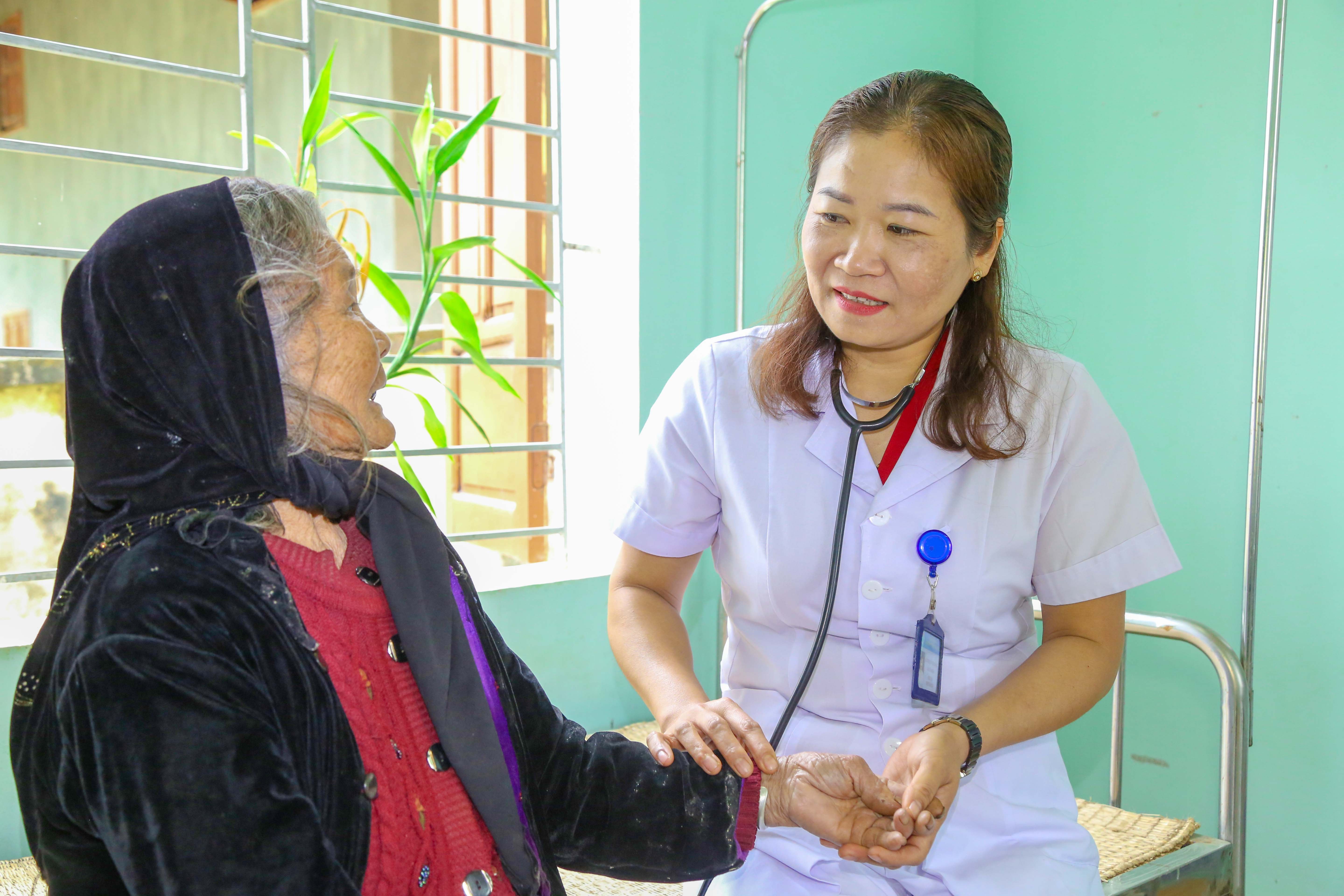 |
Always concerned about what to do to better take care of people's health. Photo: Dinh Tuyen |
In any position, physician Le Thi Quynh Giang always keeps the “fire of the profession”, constantly strives to study, and devotes herself to her work. Thanks to that, she has overcome many difficulties and hardships and received the trust of the agencies, organizations, staff at her workplace and local people.
Ms. Pham Thi Ngoc - Bachelor of Nursing at Chau Thuan Commune Health Station said: "Ms. Giang is my inspiration to constantly strive and improve. She encouraged me to go to university to improve myself and perform my work duties better."
According to Dr. Dang Tan Minh - Director of Quy Chau District Medical Center: "Over the years, as the head of the medical station, Dr. Le Thi Quynh Giang has always been close and dedicated to grassroots medical work, leading the medical station to excellently complete assigned tasks, from disease prevention to medical examination and treatment, and primary health care for the people"...
Painful thoughts and worries
According to Dr. Le Thi Quynh Giang, primary health care is the health unit that detects diseases at the earliest and treats most simple diseases (nearly 80% of diseases). If primary health care units develop and provide quality services to the people, it will save a lot in health care; avoid overloading the upper level...
However, at this time, the activities at health stations are still facing many difficulties. For example, the difficulty in human resources, with Chau Thuan Commune Health Station, according to regulations, there are 6 staff members, but in reality, there are only 4 people working. In many health stations in mountainous areas, the physical facilities of the stations are degraded; there is a lack of necessary medical equipment, causing difficulties in examination and treatment, and it is in great need of investment from the health sector and localities.
Similarly, many commune and village radio systems are also damaged, greatly affecting the work of health communication and education. Health communication and education for people in mountainous areas is also very difficult and has many obstacles. People in remote villages have uneven levels of education; two-way information reception and exchange is limited, especially for the elderly who are not fluent in Vietnamese. Meanwhile, younger people (aged 18-45) often work far away and if they are at home, they lack attention and have insufficient awareness of the importance of health care. Therefore, to do this work well, health workers themselves must speak the local language; go deep and close to the villages; take advantage of all forms and means of communication, as well as have close coordination with departments, branches and villages to carry out integrated tasks.
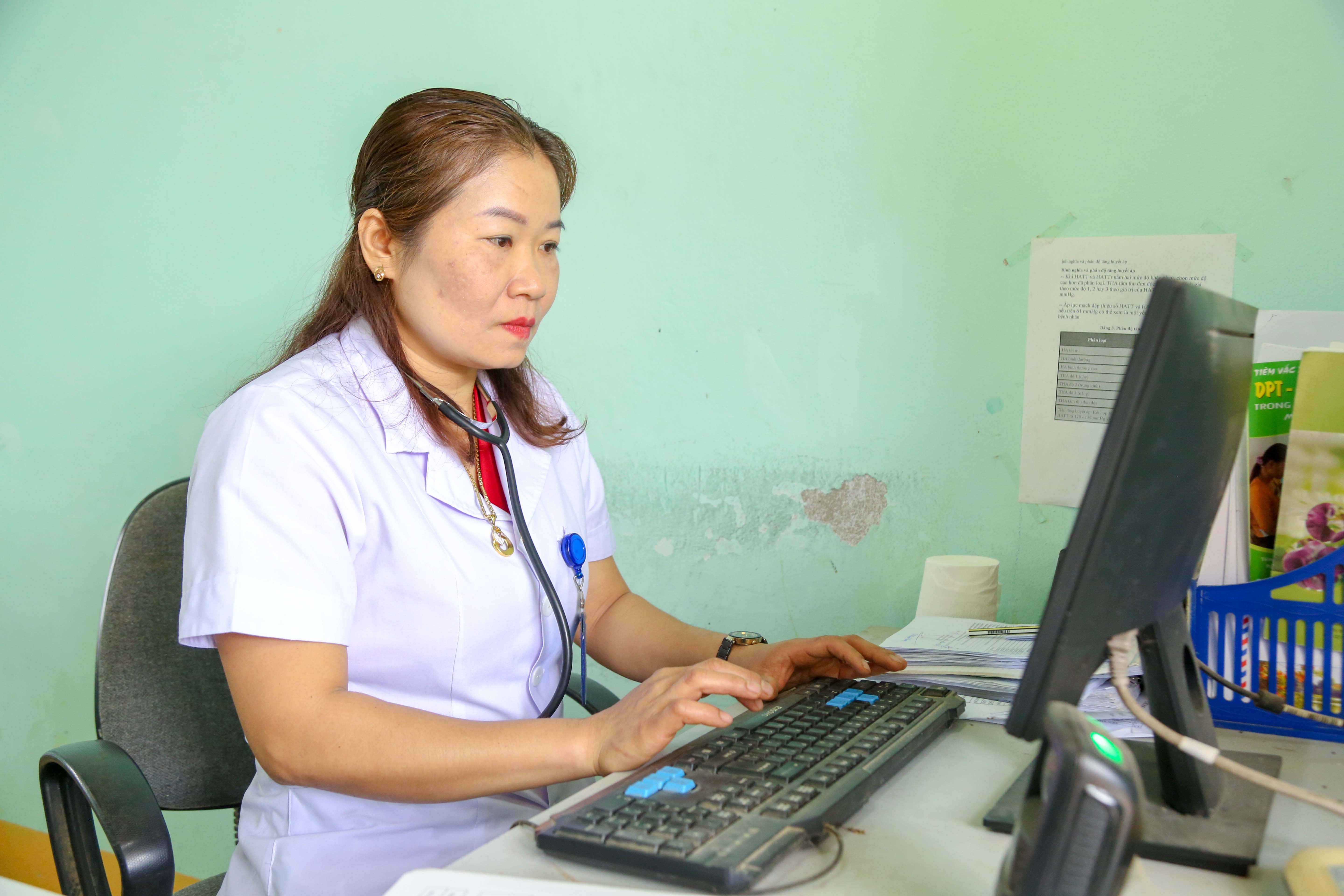 |
Doctor Le Thi Quynh Giang herself always upholds the spirit of learning to perform her professional duties well. Photo: Dinh Tuyen |
After so many years in the profession, Dr. Giang has been overwhelmed with many sad and worrying stories. For example, a pregnant woman came to Chau Binh Commune Health Station in 2018 without knowing that she had congenital hemolytic anemia. Although the doctor examined and advised the pregnant woman to go to the hospital to ensure safety during the birth process, the pregnant woman was not aware of this dangerous disease. Perhaps due to limited economic conditions, the pregnant woman decided to give birth at home. It was not until she had a difficult labor that the pregnant woman was taken to the health station in critical condition. The station staff took the pregnant woman to the Health Center, then to the provincial hospital for emergency care. The doctors tried their best but could only save the mother...
Doctor Giang shared: The mountainous area still faces many difficulties. The task of medical staff here is to comprehensively improve the quality of healthcare. To do this, in addition to the State's investment, each medical staff member needs to continuously study and improve their qualifications. Study not only medical skills but also medical ethics and service spirit. We need to remember that the patient's spirit accounts for 70% of the treatment's effectiveness. Only by having knowledge, meticulousness, and a spirit of devotion to the patient can we encourage them to firmly fight the disease; as well as improve knowledge about health care for the people, thereby guiding them to practice a scientific lifestyle and prevent epidemics./.

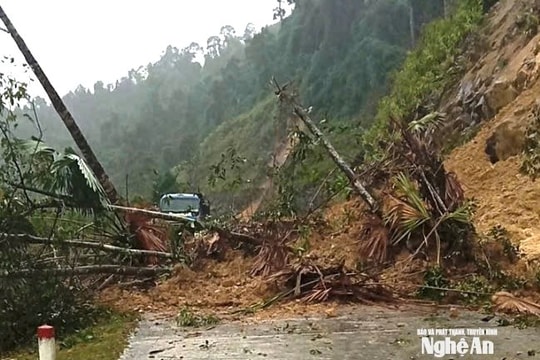
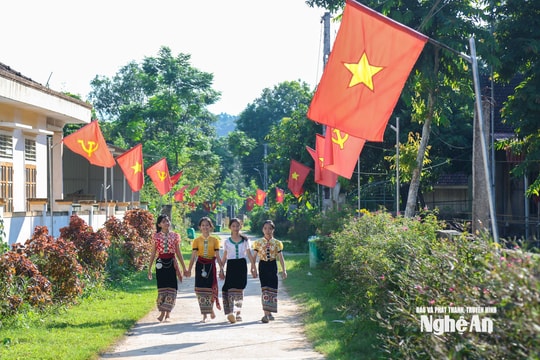
.jpg)
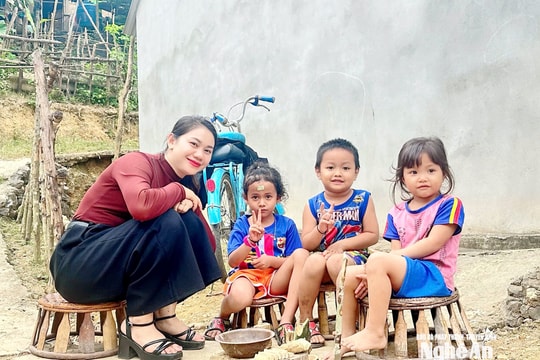
.jpg)

